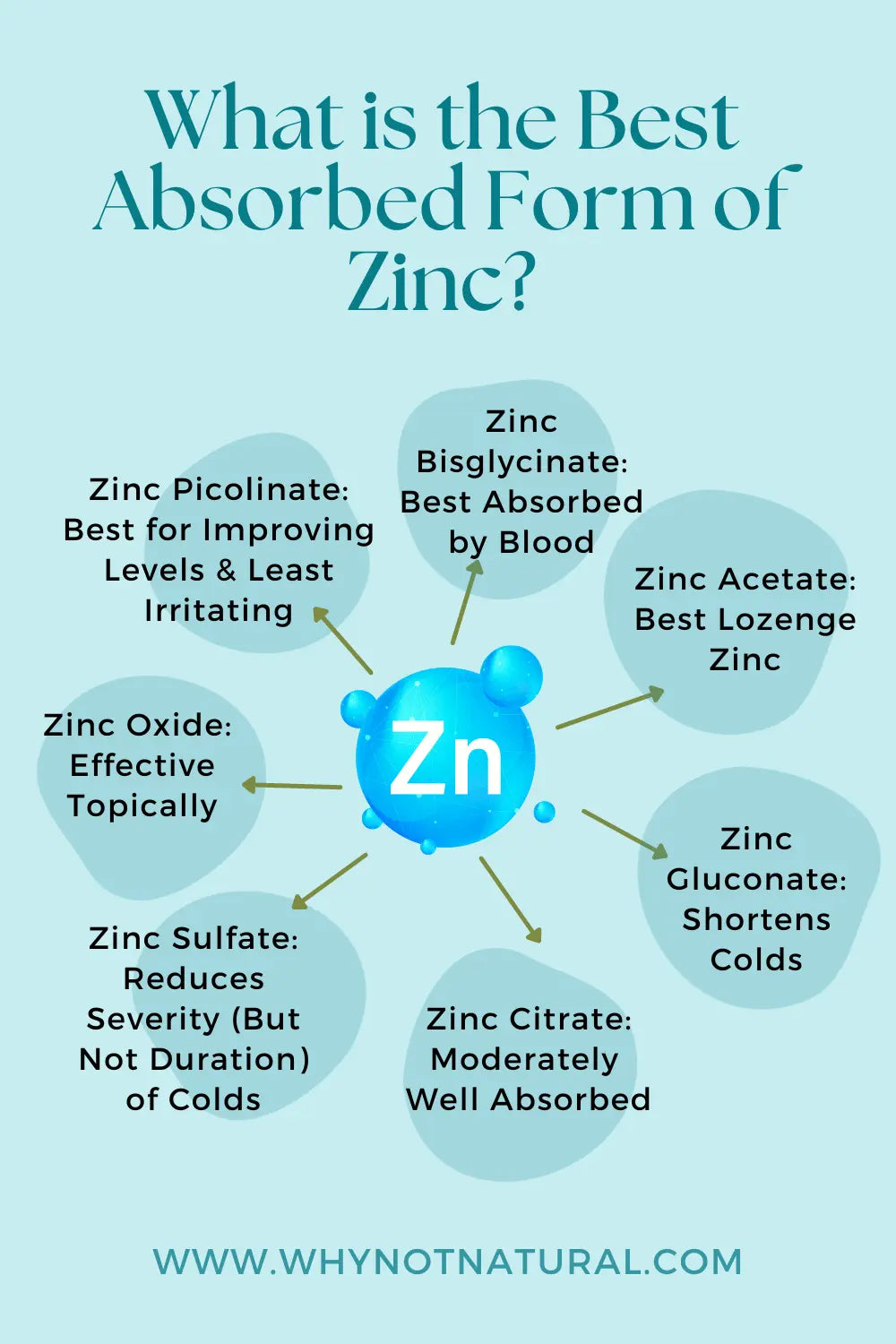

· By Kelin Marquet
What is the Best Absorbed Form of Zinc?
Not all forms of zinc are absorbed equally by the body. When choosing a zinc supplement, two common considerations are how efficiently the mineral is absorbed and how well it is tolerated by the digestive system.
Different zinc compounds behave differently during digestion. Forms that are better absorbed tend to leave less unabsorbed zinc in the gastrointestinal tract, which may reduce the likelihood of digestive discomfort such as nausea or stomach irritation.
Below is an overview of several commonly used forms of zinc, along with what research suggests about their absorption and typical use cases. The forms are discussed individually so you can better understand which option may be most appropriate for your needs.
Zinc Picolinate
Zinc picolinate is zinc bound to picolinic acid, a compound naturally produced in the body that may assist mineral absorption.
In a double-blind trial comparing zinc picolinate, zinc citrate, and zinc gluconate, researchers observed measurable increases in zinc levels in hair, urine, and red blood cells only in participants using zinc picolinate. This suggests that zinc picolinate may be efficiently absorbed compared to some other forms.
The study titled “Comparative absorption of zinc picolinate, zinc citrate and zinc gluconate in humans” tracked these changes over a four-week period.




Zinc Bisglycinate
Zinc bisglycinate is a chelated form of zinc, meaning it is bound to the amino acid glycine. Chelated minerals are designed to reduce competition with other minerals during absorption.
One study found that zinc bisglycinate showed higher short-term absorption compared to zinc gluconate. Another study comparing zinc picolinate, zinc gluconate, zinc bisglycinate, and zinc oxide reported higher blood plasma and red blood cell zinc levels within four hours for zinc bisglycinate.
These findings suggest zinc bisglycinate may raise circulating zinc levels more rapidly. However, longer-term studies are needed to fully compare its absorption over time relative to other forms.
Zinc Acetate
Zinc acetate is commonly used in lozenges. In a meta-analysis comparing zinc acetate and zinc gluconate lozenges, zinc acetate was associated with a greater reduction in the duration of common cold symptoms.
Because lozenges allow zinc to remain in contact with throat tissues for longer periods, zinc acetate is often used in this specific delivery format.
Zinc Gluconate
Zinc gluconate is widely used in lozenges and oral supplements. Research findings on its effectiveness have been mixed.
One study involving school-aged children observed a reduction in cold duration when zinc gluconate lozenges were used, while other studies did not observe significant effects. Zinc gluconate appears to be moderately absorbed but may be less suitable for long-term supplementation in individuals who experience digestive sensitivity.
Zinc Citrate
Zinc citrate is another citric acid-based zinc compound. Research comparing zinc citrate, zinc gluconate, and zinc oxide suggests that zinc citrate is absorbed similarly to zinc gluconate and more effectively than zinc oxide.
Zinc Sulfate
Zinc sulfate is a commonly used and inexpensive form of zinc, often found in liquid supplements. It is not chelated and may compete with other minerals, such as calcium, during absorption.
Some studies suggest zinc sulfate may reduce the severity of cold symptoms, though it has not consistently been shown to shorten duration. Zinc sulfate has also been associated with a higher likelihood of stomach irritation compared to chelated forms.
Zinc Oxide
Zinc oxide is poorly absorbed when taken orally and is generally not used for systemic supplementation. However, it is commonly used topically in skincare products and mineral sunscreens.
Zinc Dosage
According to the National Institutes of Health, recommended daily zinc intake varies by age and sex:
-
Adult men: 11 mg
-
Adult women: 8 mg
-
Higher needs may apply during pregnancy and lactation
Excess zinc intake over time may interfere with the absorption of other minerals, such as copper, highlighting the importance of moderation.
Bottom Line
Zinc supplements vary significantly in their absorption and tolerability depending on the form used. Digestive discomfort is often associated with higher doses or forms that are less readily absorbed.
Choosing a zinc form that aligns with your digestive tolerance, dietary intake, and health goals may help support consistent use. Paying attention to the zinc compound listed on supplement labels can help you make a more informed decision.
No matter which form you choose, zinc supplementation should be part of a balanced diet and used within recommended intake ranges. Consulting with a healthcare professional can help determine which form and amount may be appropriate for your individual needs.
Subscribe to Our Newsletter!
Want more evidence-based guidance on vitamins, minerals, and everyday wellness? Subscribe to our newsletter for educational content that helps you make informed supplement and nutrition decisions.
Sources
Comparative absorption of zinc picolinate, zinc citrate and zinc gluconate in humans
S. A. Barrie, J. V. Wright, J. E. Pizzorno, E. Kutter and P. C. Barron
Disclaimer
The statements in this article have not been evaluated by the Food and Drug Administration. The products mentioned are not intended to diagnose, treat, cure, or prevent any disease. Please check with a doctor before starting any new supplement and to ensure the advice in this article is right for you.

